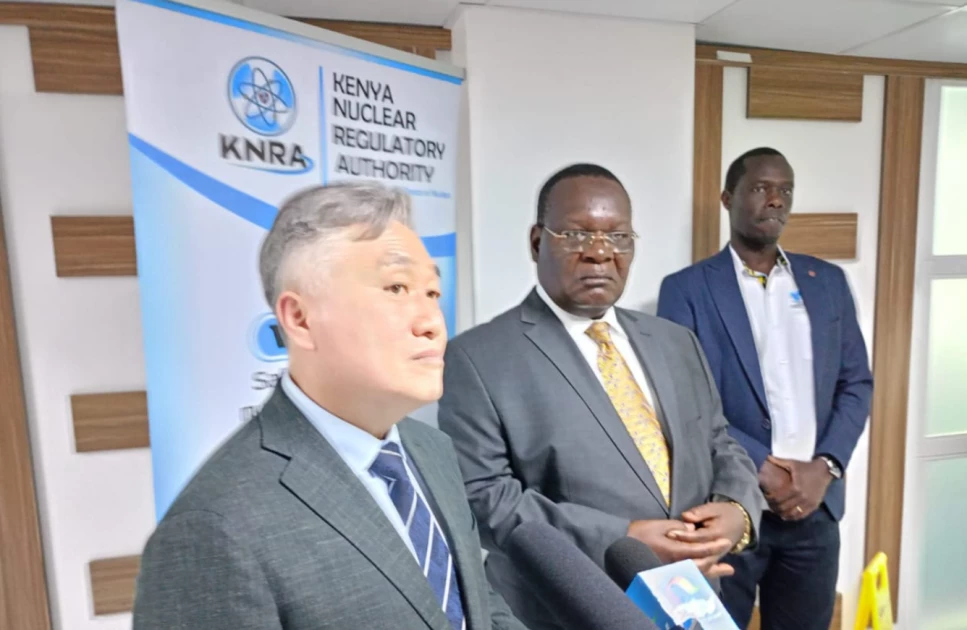Kenya, South Korea eye pact on nuclear programme

South Korean nuclear expert Yunhwa Choi address journalists in Nairobi yesterday accompanied by Kenya Nuclear Regulatory Authority Director General James Keter and Board Chairman Omondi Anyanga. PHOTO | COURTESY

Audio By Vocalize
The government has gone flat out in seeking foreign partners
to support Kenya’s nuclear sector, including the requisite regulatory
functions.
A third of the almost 30 countries currently considering
nuclear power are in Africa, with Kenya hoping to have its first nuclear power
plant in 2037.
On Friday, Kenya Nuclear Regulatory Authority (KNRA) officials
held talks with South Korea nuclear experts with a view to hammering out a
cooperation agreement.
The meeting discussed regulatory aspects of Kenya’s nuclear
power programme and how the country could benefit from South Korea’s
experience.
The KNRA team led by board chairman Omondi Anyanga and
Director General James Keter said Kenya’s successful nuclear power debut will
largely depend on funds, adequate regulatory controls and development of
manpower.
“Korea has supported Kenya in many ways. We look forward to
productive engagements in many respects. There’s a lot to learn from South
Korea’s journey with nuclear,” Mr. Keter told the press after the meeting.
The Director General said South Korean institutions had in the
past trained many nuclear experts from Kenya and other African countries.
Mr. Anyanga said KNRA will work close with international
partners, research agencies, academic and the Nuclear Power and Energy Agency to
prepare adequately for what he termed Kenya’s nuclear take-off.
The visiting delegation comprised Yunhwa Choi, the Programme
Manager of Korea’s Nuclear Nonproliferation Education and Research Center
(KAIST), Prof. Sung Yim KAIST Vice President, Dr Bum-Jin Chung of Kyung Hee
University who is also the President of the Korea Nuclear Society and Dr
In-Cheol Lim, Vice President of the Korea Atomic Energy Research Institute.
Bum-Jin, who has previously made a substantial input towards
Rwanda’s nuclear pursuits, said part of their interest was to understand the
level Kenya had reached in building its regulatory infrastructure.
“Protection of the public and the environment is key in any
nuclear undertaking,” he said while citing the experiences from different
countries.
KNRA Director for Licensing Shadrack Kiti said consultations
were ongoing with a view to having Kenya ascend to relevant treaties such as
the convention on nuclear safety, the convention of early notification of
nuclear accident, the convention on assistance in the case of nuclear accident
and radiological emergency and joint convention on safety of spent fuel
management and the safety of radioactive waste management of 1997.
“In our regulatory development journey, KNRA is seeking
financial support on viable financing options towards regulation development
since such a process is capital intensive. We are seeking a memorandum of
understanding with KAIST, Hyung University and the Korean Nuclear Society for
training purposes,” Mr. Kiti said.
Experts say there are concerns about the continent’s readiness
to harness nuclear and get it right. The meeting came barely a month after
Kenya kicked off a special post-graduate training on nuclear and radiation
safety.
The post-graduate course for Africa’s English-speaking
countries is being overseen by the International Atomic Energy Agency (IAEA)
and the Kenya Nuclear Regulatory Authority in conjunction with local
universities and hospitals.


Leave a Comment